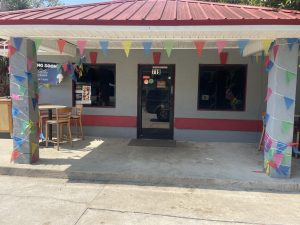Here to help: How sexual assault victims can utilize on campus recources
October 19, 2017
Getting Help
Victims of sexual assault are encouraged to report their assault to a law enforcement agency. These include the Georgia Southern University Police, which can be contacted at 912-478-5234, the Statesboro Police 912-764-9911 or the Bulloch County Sheriff’s Department at 912-764-1771.
Victims are encouraged not to change clothes, shower, eat, drink or clean themselves in anyway before a medical exam can be performed. If clothes are removed, victims should place them in a paper bag to prevent loss of evidence. Finally victims should document any physical bruises or marks left from the assault.
At the law enforcement agency, victims will be interviewed by police about their assault and a forensic exam will be conducted to collect any evidence on the victim. Victims should expect multiple follow up interviews during the process of the investigation, according to Laura McCullough, Police Chief of Georgia Southern University Police.
The extent of the investigation is up to the victim. The decision to take the case to trial is the decision of the victim, but it is difficult to get a case to that point according to McCullough.
{{tncms-inline content=”<p>&ldquo;These cases are very hard to even get to [trial],&rdquo; said McCullough. &ldquo;I&rsquo;ve had one sexual assault case make it to the courtroom and I&rsquo;ve been doing this for 17 years.&rdquo;</p>” id=”36bb08ad-b476-43f2-8608-4241780e8f4f” style-type=”quote” title=”Pull Quote” type=”relcontent”}}
Victims, however, do not need to report their assault to law enforcement if they do not wish to.
Besides law enforcement, victims can report the assault to the Title IX office, your community leader or residence director or chose to not report the assault at all.
Resources
There are a variety of both on and off campus resources available for students.
Counseling Center
A major concern for the victim is their mental health. That is why any victim of sexual who reports their assault to public safety are referred to the counseling center, but victims can make an appointment with the counseling center without going to the police.
The counseling center can be found on campus on Forest Dr.
Sexual Assault Response Team
The counseling center also runs a Sexual Assault Response Team. SART attempts to bring awareness to GS’s campus in the hope that raising awareness will reduce assaults.
For information about joining, email Jodi Caldwell at jodic@georgiasouthern.edu.
They also sponsor the student organization, the Sexual Assault Student Educators.
Sexual Assault Student Educators
The Sexual Assault Student Educators is a student organization that work to promote discussion between students on the issue of sexual assault. They strive to increase both awareness and sensitivity to the topic of sexual assault, educate students on risk factors related to sexual assault and to reduce the amount of sexual assault incidents.
Health Services
Any student who reports a sexual assault with be referred to the Statesboro Regional Sexual Assault Resource Center or Teal House. Health Services offers directions or if needed transportation to the SRSAC.
They also offer follow up exams for sexual assault even if the initial exam was performed at the SRSAC.
These exams include: STD exams, a follow up on the initial exam performed by the Teal House, external genital exams and breast exams.
Teal House
The Teal House offers a 24-hour crisis hotline for victims that can be reached at 1-866-489-2225.
They also offer onsite forensic exams done by their Sexual Assault Nurse Examiners, who collect and evidence left on the victim and turn it over the police to aid in the investigation.
After the assault, they offer in person crisis counseling and support groups.
They can currently be found at 18 N. College St., but they will be moving into their new building at 209 S. College St. in mid October.
RAD
GS offers the Rape Aggression Defense System training for female students. RAD is a nationally taught self defense course that teaches women easy to learn techniques and methods to protect themselves, not a material arts course.
More information on RAD, including when classes will start, can be found on the Public Safety website under the RAD tab.
The Terminology
According to the 2017 Annual Security Report released by Public Safety, a sex offenses is defined as “any sexual act directed against another person, without the consent of the victim, including instances where the victim is incapable of giving consent.”
Sexual offenses are then broken down into two types, forcible and non forcible, with forcible requiring the use of force and non forcible not requiring the use of force.
Sexual assault is defined as “any sexual act directed against another person, forcibly and/or against that person’s will; or not forcibly or against the person’s will where the victim is incapable of giving consent, as well as incest or statutory rape.”
Finally, stalking is defined as “engaging in a course of conduct directed at a specific person that would cause a reasonable person to fear for their safety or the safety of others or suffer substantial emotional distress.”
Statistics
According to the the 2017 ASR, there were six forcible sexual offenses in 2013 and four instances in 2014.
For non forcible sexual offenses, there were none in 2013 and only one in 2014.
In 2015, sexual offenses stopped being recorded and overall sexual assaults here were four cases of sexual assault reported to public safety in 2015 and three cases reported in 2016.
There were also three cases of stalking reported in 2016, but none reported in 2015.
These statistics are only cases that have been reported directly to Public Safety. If a crime happened and it was not reported to Public Safety, it will not appear on the ASR.







